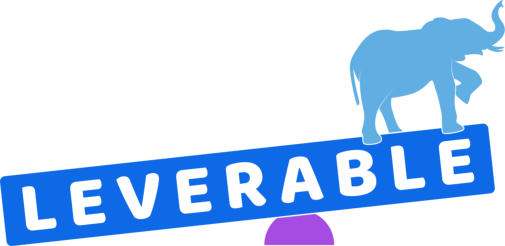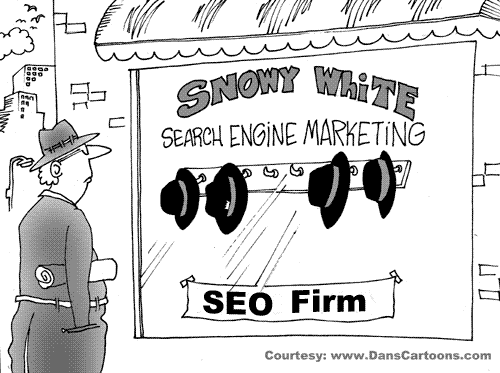If you’re a business owner, you’ve probably heard about search engine optimization (SEO). It is an entire industry that’s based on helping clients gain visibility on search engines like Google, Bing, and Yahoo.
There is no magic switch that turns your website into the top listing on a search engine results page (SERP), so SEO firms have to find creative ways to boost the value and authority of a client’s site. There isn’t an easy formula for doing SEO, so agencies use widely different strategies to accomplish the same goal.
In a nutshell, digital marketing consultants and agencies can use “white hat” or “black hat” SEO tactics. Some are very open about which side of the spectrum they fall on. Others are not.
What’s the difference?
White Hat SEO refers to industry-supported practices that optimize a site’s organic search engine performance within search engine guidelines. Google Search Essentials point out specific practices that they encourage you to follow. Generally doing what’s good for users will keep you in compliance.
Black Hat SEO, on the other hand, is designed to outsmart or “game” search engine algorithms, essentially refusing to play by the rules that Google and other search engines create. Black hat SEO opts for short-term gains through practices that can eventually lead to site penalization.
When you first approach an SEO company, they will likely admit to using only “white hat” tactics. Since disobeying search engine guidelines does not violate laws, many agencies end up deploying a little black hat SEO to get faster results and keep clients happy. When you’re searching for an SEO company, you must understand the risks they want you to take vis-à-vis search engine guidelines.
How do you tell if your SEO company is white hat or black hat? Unfortunately, someone has to interrogate them. I’ll walk you through the questions you need to ask and the answers you should be looking for.
Question #1: Will your SEO company purchase links in order to enhance my site’s backlink profile?
Desired Answer: “No, our firm doesn’t use paid links as a long-term SEO strategy. Google’s search algorithm penalizes sites that purchase business listings, so we only resort to buying links that are ‘nofollow’ and don’t cause penalties. Instead of buying links, we try to earn links with creative content.”
Question #2: Do your SEO services include content marketing?
Desired Answer: “Of course. How you treat content could be the factor that determines your success. A content strategy for both onsite and offsite will help bring about the results you need. This may involve giving you a custom content plan or deploying our team of talented content producers.”
Question #3: What kind of metrics will your team use to measure my site’s SEO performance?
Desired Answer: “Every business has certain key performance indicators that can move the needle and make it grow faster. They may be conversion rate, qualified leads or simply organic search visits. There are many possibilities. Before we engage with you, we ask questions to discover what these are and include it in your reporting so we can track your progress over time.”
Question #4: Do you use automated software to spin articles and promote content to networks?
Desired Answer: “Absolutely not. Auto-posting of computer generated articles is silly and doesn’t work as a long-term SEO strategy. We’re all for automation but content creation and link building should never be automated.”
Question #5: Can you offer me a complete timeline of goals that my site can reach within the next 6 months?
Desired Answer: “Any SEO campaign should set goals and expectations in the beginning. These will help us stay on the same page and keep track of progress and adapt our strategy as we make new discoveries.”
Question #6: Will your SEO team impersonate me in order to solicit links from other websites?
Desired Answer: “As your business partner, we won’t use your personal information to promote your site. We may present ourselves as a team member or agent on behalf of your team, but not as you.”
Question #7: Do your recommendations cover onsite optimization as well as offsite SEO?
Desired Answer: “All SEO strategies have two prongs: optimizing the site from the inside and attracting visits from outside. This refers to both onsite and offsite SEO, respectively. A true SEO strategy takes into account both onsite and offsite factors.”
Question #8: As a small business, can your company boost my local search results?
Desired Answer: “SEO and local search (maps, business listings, etc.) algorithms are distinct from each other and require different tactics. Let’s separate the two and assess your needs first, then present you with options for both.”
Question #9: Will your team help manage my social media accounts?
Desired Answer: “We can, but the first thing we do is make sure your site is set up so that social media users can interact with ease. Then we determine what social media sites will work the best for your business and tell you how to best optimize them. Finally, we evaluate your social media practices and find ways to get the kind of engagement that gets you more customers.“
Question #10: Why should I choose you instead of another SEO company?
Desired Answer: “We can show you results we’ve achieved; We’re experienced at providing businesses with SEO results; we specialize in SEO (the real thing, not a jack of all trades); we give you custom recommendations that you need (not a preset package).”
While the SEO industry is full of competition, you can find the perfect SEO company if you’re armed with the right questions. Don’t hesitate. Interrogate. And you won’t get duped by unsavory SEO folk. Work with someone you like. Find that special partner who will truly help your business grow.







5 Responses
Nice post, although I dont completely agree 100% on the paid links. I went out of my way to ask for a nofollow on a sponsored link and the person had no idea what I was talking about. They ended up promoting the post with a broken link to my site.
Darren, that’s funny. Some of the best links I’ve ever had turned out to be broken :)
Hi Michael.
Thanks for writing this post, I just hired an SEO and I had to ask him some of the questions you mentioned here before the hire.
I’m sure this post will help lots of people.
Cheers
Dan
Michael,
You have put some great interrogative questions out there. The thing is; people say something, and they do something else. I am 100% no agency will accept upfront that they will make use of paid links, but most of the time they do. I guess one has to make use of tools to analyse site after short intervals, and see where exactly they are getting the links from. I think that would be a more solid approach.
That’s my two cents.
Faraz.
Faraz,
Trust me – I certainly agree that many companies say one thing and do something else. But that goes for more than just SEO, and really every industry in general.
Unfortunately, most small business owners don’t know how to use search console to examine how their site is doing or where links are coming from. It’s easier to hand it off to another company and say, “you handle this.”
I think the best defense for getting duped is by being knowledgeable about the service you’re buying into. If you ask a certain question which stops the SEO company dead in their tracks, then you know that this company probably isn’t right for you. At the end of the day, it might even be a gut decision – did the company seem shady or did they present themselves as informed and responsible?
Of course, a potential SEO company might not be completely straightforward with you, but it’s important to understand what that their business philosophy is.
Michael